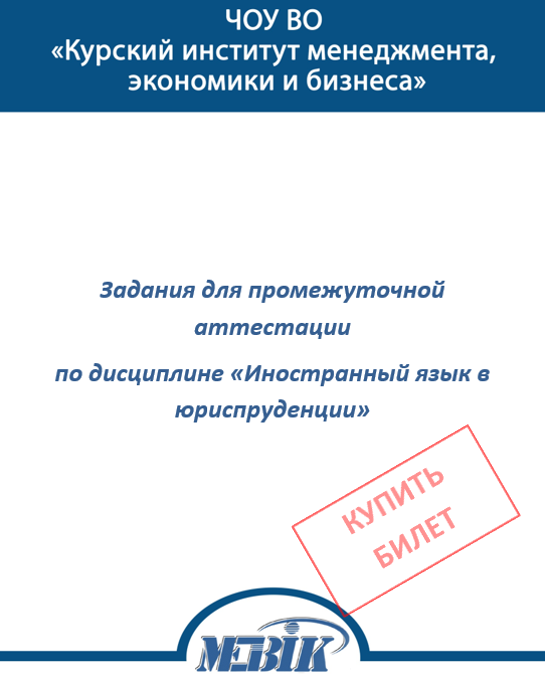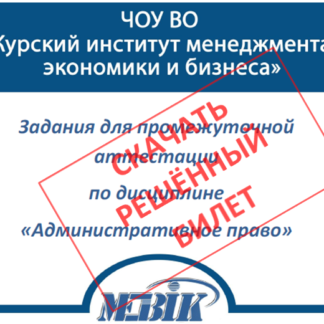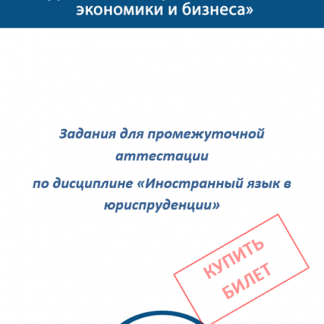Билет 3 Иностранный язык в юриспруденции
Первоначальная цена составляла 900₽.450₽Текущая цена: 450₽.
Билет №3 для промежуточной аттестации по дисциплине «Иностранный язык в юриспруденции» в Курском институте менеджмента, экономики и бизнеса. – Курск: типография МЭБИК, 2023 год
Артикул 0016387
БИЛЕТ 3
Task 1. Read and translate the text “Checks on the Judiciary”
Checks on the Judiciary
The Constitution provides several checks on the judiciary to be exercised by the other branches to maintain the system of separated powers. No one ascends to a federal judgeship without presidential appointment and Senate approval. The executive has the power of granting pardons and reprieves of judicial sentences, an especially significant check on state judiciaries when exercised by governors. Presidents have this same power but use it less often.
Congress has even more external controls over the courts. The Senate can reject a nominee, although this has happened in fewer than 10 percent of all Supreme Court appointments. Congress can impeach judges, also a rarely invoked but important check. It can effectively nullify a court’s interpretation of a statute’s imply by passing a new law, and it can react to a court’s constitutional interpretation by introducing a constitutional amendment.
The legislative branch is also empowered to change the federal court’s appellate jurisdiction. Congress can also expand or contract the size of the federal judiciary, including altering the number of justices on the Supreme Court. While it often creates new district court judgeships, it has not changed the number of Supreme Court justices since 1869, when nine became the standard, nor is likely to do so.
Just as judges are aware of external checks on their power, so too are they mindful of self-imposed limitations. For example, the courts will try to avoid ruling on cases they categorize as “political questions”, which are more properly resolved by the elected branches. Another doctrine is that of stare decisis, literally meaning “let the decision stand”, or following precedent in similar cases. Decisions of higher courts are binding on lower courts, but stare decisis implies that decisions of a higher court will be binding on future cases in that same court as well. Courts can and do overturn their previous decisions, but because of the norm of adherence to precedent, “the law” is relatively slow to change. Combined with the long tenure of judges, there is an important institutional memory available for judicial decision-making and a continuity that further strengthens support for the courts.
Reduced to their most basic purpose, all courts in all political systems exist to resolve disputes. Conflicts presented before judges range from minor squabbles3 among private citizens to the scope and legitimacy of governmental action at the highest levels. Whether judges use written constitutions, elaborate legal codes, a common law tradition or religions texts, their decisions must be based on some generally recognized and approved standard if they are to endure.
By removing courts from the daily political pressures and rapidly changing social forces confronted by other government leaders, societies can best preserve the element of judicial independence so vital to stable political systems.
Task 2. Complete the following sentences.
- No one ascends to a federal judgeship without … .
- Presidents have the power of granting pardons and reprieves of judicial sentences but … .
- The Senate can reject a nominee although … .
- Congress can impeach judges, also … .
- The legislative branch is also empowered to change … .
- Just as judges are aware of external checks on their power … .
- Another doctrine is that of stare decisis which means … .
- Reduced to their most basic purpose, all courts in all political systems exist … .
- Conflicts presented before judges range … .
- Whether judges use written constitutions, elaborate legal codes, a common law tradition or religions texts, their decisions must be based on … .
Task 3. Fill in the gaps with the correct prepositions.
- High Court judges are appointed … the Queen … the recommendation of the Lord Chancellor.
- The Attorney General is responsible … prosecution policy.
- The case was dismissed … lack of evidence.
- The purpose of the civil courts is to provide a remedy … the wronged party.
- It is very important to be familiar … the distinction between civil and criminal courts.
- A case requiring a heavier punishment must be referred … the Crown Court … sentencing.
- Both parties can appeal … a higher court for reconsideration of the decision.
- There was no question … sending her to prison.
- The solicitor normally gives the reason … defending someone in these circumstances.
- Nobody can be found guilty … committing a crime, unless a sentence of the court is according to the law.
- The new law on dropping litter comes … force next month.
- Ann was released from prison and she is … probation.
- The police have charged her … driving without due care and attention.
- The matter was too difficult … the solicitor to clarify it within a week.
- I would never have suspected Jim … being the culprit.
- When a defendant is found guilty … the magistrates he may appeal to the local Crown Court.
- Criminal offences may be grouped … three categories.
- The burden of proof is … prosecution in criminal cases.
- There are various ways of classifying courts, thus it is possible to classify them according … their functions.
- Magistrates must as a rule sit … open court to which the public and the media are admitted.
Приложение 1
Task 4. Produce the whole sentence in English.
- According to the traditional point of view the judges (применяют соответствующие законы, но не участвуют в расследовании дела).
- Some cases (могут выходить за пределы компетенции присяжных заседателей).
- For the parties bringing a civil or criminal action (используются разные названия).
- Judges must be (независимы от сторон спора).
- The prisoner stood (по обвинению в убийстве).
- Mr Smith is charged with (убийстве при отягчающих обстоятельствах).
- Crown court is presided over by a judge, but (решение о виновности или невиновности выносится жюри присяжных).
- Cases concerning any civil disputes (рассматриваются судьей суда графства без присяжных).
- Some courts such as magistrates’ (не имеют права рассматривать апелляции).
- The criminal courts must determine (совершил ли подсудимый преступление и наказать преступника).
Grammar Revision: Participle I, Participle
Use the proper form of the Participle.
- The judge told us what crime the accused would be guilty of, if evidence (to supply) by the prosecution was true.
- (To finish) his summing up, the judge asked the jury to consider their verdict.
- When (to ask) about the difference between a solicitor and a barrister, the secretary said that solicitors could appear in the lower courts of justice and could speak for their clients.
- One of the specifications of the English legal system is that a (to practise) lawyer has an obligation to hold either a place of a barrister or a solicitor.
- (To accuse) of burglary and (to find) guilty, the court sentenced Mr. Black to three years of imprisonment.
- The solicitor says he feels confident (to have) an idea the man he is defending is not guilty.
- The suspect (to use) the services of a famous lawyer could prove his alibi.
- In the Crown Court three main kinds of judges preside (to depend) upon the seriousness of the case: High Court judges, circuit judges and part time judges.
- The judge is always a legal expert and is also paid for work (to hear) serious cases in the Crown Court. 10. (To have) the verdict of the jury the judge delivered his judgement of punishment.
Билет выполнен и был сдан на положительную оценку. Билет можно скачать сразу после покупки. Для покупки билета поместите его в корзину и оформите заказ. После оплаты ссылка на файл придет Вам на электронную почту. Заказать уникальный билет, который будет выполнен специально для Вас, можно здесь: ВЫПОЛНЕНИЕ УНИКАЛЬНОГО БИЛЕТА ПО АНГЛИЙСКОМУ ЯЗЫКУ для МЭБИК.



